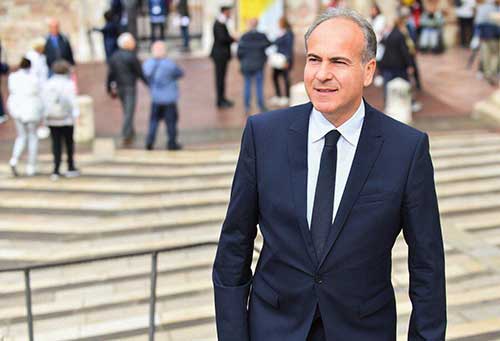Gianfranco Battisti at the fifth edition of “Il Cortile di Francesco”
“In this time of great transformations, our Group is called upon to set an example, directing its actions towards the full respect of dignity and common good, the environment and future generations.”— The speech of FS Italiane Group’s Chief Executive Officer and General Manager"

Assisi, 23 September 2019
The fifth edition of “Il Cortile di Francesco” opened in Assisi on 18 September. This year’s main theme was “In-contro. Comunità, popoli, nazioni”, a topic on which more than 70 speakers spoke: people and protagonists of civil society, the economy, the world of religion, culture and information.
Gianfranco Battisti, the FS Group Chief Executive Officer and General Manager, spoke on the closing day of 22 September at the round table titled “A people-oriented economy to tackle the climate crisis and produce work. A challenge for politics and society”, also attended by the Chairman of Confindustria, Vincenzo Boccia, the CEO of Enel, Francesco Starace, Claudio Granata, Chief Services & Stakeholder Relations Officer of Eni, and Fabio Lazzerini, Chief Business Officer of Alitalia.
“Great changes await us in the coming years that will affect all of us and the new generations. We have to grow accustomed to reading a more multifaceted, dynamic and multifaceted reality and learn to look far ahead, to anticipate challenges.”
With these words, Gianfranco Battisti addressed the main trends in the future economic and social context. “Phenomena such as changes in the social composition, increasing inequalities, digitalisation and scarcity of natural resources require us to not consider only capital and labour as the main factors of production. Natural capital, social capital and human capital are equally important, and in some sectors—such as mobility—they are crucial,” the CEO continued.
In particular, there will be an ageing population in the coming years that, in parallel, will be increasingly concentrated in certain major cities such as Rome and Milan, with a great impact on traffic and liveability. People will work differently, for example using smart forms of work with a reduced presence in offices, being numbers that will change today’s commuting. In this new scenario, a reduction in pollution will become even more important, with the growth in electric vehicles reaching 15% for private and up to 100% of public vehicles. There will be a doubling of ‘shared mobility’; we will see a continuous change in how people are informed, select and purchase goods and services online.
Finally, the country and its transport and infrastructure system will have to address the implications of ongoing climate change and a continuous increase in hydrogeological risk. In the face of such important transformations, the only chance for the future is discontinuity, inverting the direction and changing models.
Gianfranco Battisti then focused on the responsibility of the FS Group in this new scenario: “In this time of great transformations, our Group is called upon to set an example, directing its actions towards the full respect of dignity and common good, the environment and future generations.” It is precisely the transport sector that can and must play a key role in the sustainable redefinition of the economy. Changing the choices regarding mobility that form daily habits of the citizens can lead to major improvements in terms of traffic reduction, safety, pollution and pollutant emissions, bringing benefits to people’s quality of life and reducing risks to the integrity of the environment. Similarly, a modal shift of freight from road to rail would also bring enormous benefits. I am convinced that the type of sustainable development on which we must focus is that in which the ability of the company to generate value is based on constant attention to human assets, on the progressive strengthening of know-how and distinctive skills, on technological and product innovation and on the respect for the environment. Thus, the margins to be conquered and consolidated are those that arise from sustainable choices and good practices, which are based on continuously listening to our customers, on the ability to oversee the market, interpreting the needs of people.”
“The FS Group has set itself the goal of offering a service that increasingly meets the specific needs of people, especially those who travel, first of all the commuters who journey each day for work reasons. The coming years will be decisive in demonstrating, in practice, that a sustainable approach is the way to go if we want to pursue shared development, lasting and above all beneficial for all. From this point forth, it will therefore be important to evaluate every decision, from the most strategic to the most operational, in the logic of a vision of sustainability and long-term,” Gianfranco Battisti concluded.
The closing of the fifth edition of the Cortile di Francesco was entrusted to dialogue with the words and images amongst the Cardinal Gianfranco Ravasi and Sebastião Salgado. The “Cortile di Francesco 2019” was organised by the Sacro Convento di Assisi, by the Pontifical Council of Culture and the “Oicos riflessioni” Association, in collaboration with the Umbrian Bishops’ Conference and the Umbria Region.